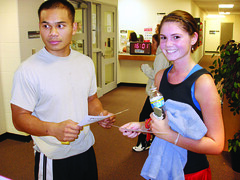Students of all ages fear the extra weight. In an IBC event, a nutritionist dispels the myths.

The concept of the “freshman 15” is a myth, though, the IBC Student Recreation Center hosted a program called “Avoiding the Freshman 15” Sept. 17.
The program featured Clinical Dietitian Nicole Patience.
“The freshman 15 is not actually a reality for most students,” Patience said, as she opened the program.
Research shows most students actually only gain about five pounds as freshmen in college, she said.
“My first tip would be to decrease the anxiety about the freshman 15,” she said, “because sometimes that causes people to think too much about weight and food.”
The title of the program simply served as a way grab new university students’ attention. The themes that emerged as Patience got to the meat of her program, however, were anxiety and how thoughts can play a role in eating-habit formation.
This anxiety can “cause a person to be overly concerned with what they are eating and how they are eating it,” Patience said.
“Someone who is [anxious about] eating may find that they isolate themselves and don’t want to eat in a group so that other people don’t see what you are eating. Social eating events can be stressful because they think that people will judge them based on what they eat,” she said.
Patience said her main goal was to raise awareness about weight and health issues. More than 20 students took time from their workouts to visit her booth in the IBC’s lobby, and many of the visitors weren’t freshmen. Junior civil engineering student Chaz Lynch was one of them.
“My main concern is on cutting weight for a grappling tournament that I have next week,” Lynch said. “I’ve been training martial arts my whole life. Everyone cuts weight for competition, so my goal is to find the healthiest way to cut. I was asking Nicole how much water is safe to lose and still be healthy for when I cut.”
Patience said she was very interested in Lynch’s concern. There are many ways to reach weight goals, but Patience said it is most important that those goals be reached in a healthy way. The length of time a goal is achieved in should not be a student’s main concern.
Pre-nursing student Melissa Demianovich, a freshman, said this was the most important take-away from the program.
“I’m interested in this program to learn about good health and to look good but mostly for the good health [tips],” Demianovich said, adding that she may also use this kind of information in her intended career.
This program sought not only to educate students on healthy eating but also on how to maintain a healthy lifestyle through support.
One such means of support is a special body-image support group called “Body Beautiful.” The group, which was created by Student Health Services, is open to any individual who would like support in issues of self-esteem, building confidence and accepting who they are, by addressing these in a small, group setting.
Patience’s program had something to offer nearly every student’s concern.
Even senior mechanical engineering major Drew Krause, who is a vegetarian and has been all his life, took away some valuable information.
“I’m not concerned about weight, at least not for myself. I think that everyone should know a little about healthy lifestyle habits,” Krause said, offering a few suggestions of his own.
“As long as you’re not vegan, I would suggest that vegetarians make sure that they get their sources of dairy and protein because it’s hard to find those things in vegetables,” he said.
Since freshman year, Krause has gained the five pounds that Patience had stated is the reality for most college students.
“I have gained about five pounds, but it’s definitely more muscle than it is fat, as a result of weight-training and cardio work,” he said. “I’m a lot more toned now than I was freshman year.”
Krause said he used to be chubby when he was in high school. Since he has been eating less junk food and has started exercising regularly, he hasn’t had much trouble with his body image.
“Now,” he said, “I just snack fruits and stuff when I’m hungry.”
Quentin Williams can be reached at quentin@temple.edu.


Be the first to comment